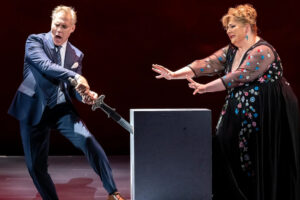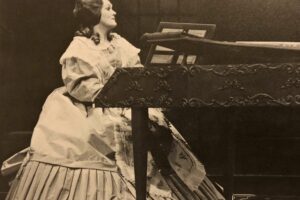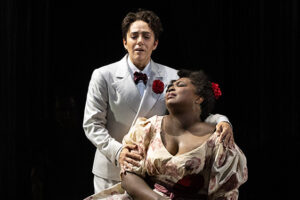

Alexandre bis (Alexander, twice) is a surreal bedroom farce, written in French, possibly because all such farces should be in French, hein? Full-bearded Alexandre wishes to monopolize his wife, Armande’s, bedroom fantasies as well as her bedroom activities, so he impersonates a (beardless) cousin from Texas. Armande sees through the disguise and affects to yield; then she feels guilty; then she has erotic dreams involving an athletic friend and her husband’s bearded portrait (who has been offering spoken commentary on the sung action); then she decides she enjoys fooling around. The suspicious husband, as usual, has made a fool of himself. (Had Martinu seen Molnar’s The Guardsman? Probably.)
Comedy on the Bridge is set to a text in Czech: Five people, each obsessed with a personal problem or two but not averse to flirtation, find themselves trapped on a bridge between two nameless armies at war, represented by humorless sentries. The charm and folly of this may nonetheless have had a certain resonance in 1935, when Europe was full of displaced persons; it may have even more today. What would Beckett or Sartre have made of such a tale? Something intense, perhaps—but Martinu’s touch is always light. This is a farce because the people are cardboard clichés and because their predicament has a solution, but it leaves an echo in the skull or heart.
What Gotham Chamber Opera always does best is sophisticated entertainment with some fine music-making. The sets by Cameron Anderson and the costumes of Fabio Toblini stress artifice, everything in balanced blacks and whites like doilies or silhouettes, French curls for Alexandre, forests primeval and peasant dress for Bridge. James Marvel does nothing to “humanize” the clockwork behavior—the stories do that for him, and the elegant puppet-show gestures make the merry tales universal. A man beholding a pretty girl will naturally steal a kiss; her fiancé or his wife will show up at that very moment. Clockwork. Maids do silly things with feather dusters. Sentries are logical but unreasonable. Nobody dies, even when threatened with knives or bayonets or bombs.

The singers, young, acrobatic and elastic figures all, made attractive sounds all night, suggesting that their limits had not been tested. I’d be glad of further opportunities to hear Jenna Siladie’s cool and sizable soprano (she sang virtuous Armande and Popelka, the kissable peasant girl) and the orotund and persuasive baritone of Jarrett Ott (Alexandre, Sykos the fiancé). Jason Slayden brought an attractive lyric tenor to Oscar the athlete and Ucitel, a confused intellectual stuck on the bridge with an insoluble riddle; one is not surprised to see Rodolfo or Romeo in his vita. Joseph Beutel spoke beautiful French as the portrait of Alexandre and sang beautifully in Czech as the philandering farmer.
Cassandra Zoe Velasco, like every French housemaid, combined twirling a feather duster with appearances as the goddess of marriage, her attractive mezzo having far too little to do. Abigail Fischer sang the Fricka on the bridge, holding her errant husband to heel—an unsympathetic role here as in the Ring, on that other bridge. All these voices sounded sizable and well-grounded in the grateful acoustic of the Gerald R. Lynch Theater at John Jay College.
Both these charming pastimes, charmingly presented, seemed to me rather appetizers than entrées, curtain-raisers, amuses-bouches (as my old friend La Cieca might say). At the early end of an entertaining evening, I was still hungry, longing for heartier fare as well sung and well staged as these—two tapas do not make a dinner. “What once was a meal is figs … no, not even figs. Raisins.”
But if your appetite is light, these performances will go down like a good Prosecco.
Gotham’s next project is to bring back Montsalvatge’s El Gato con Botas (Puss in Boots), one of their most delicious triumphs, a brief but filling, entrancing occasion.
Photos: Richard Termine
























Comments